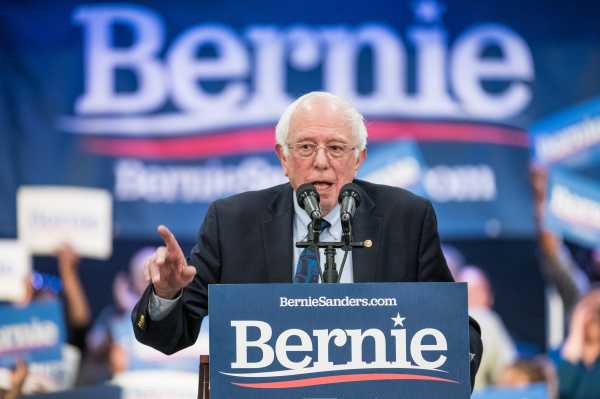
The Democratic Socialists of America have endorsed Bernie Sanders’s campaign for president, despite some consternation within the organization regarding his comments on reparations.
The DSA announced its Sanders endorsement on Thursday evening after a meeting of its national political committee. The decision was widely anticipated, but there was a wrinkle: the group’s AfroSocialist and Socialists of Color Caucus, a section within the organization focused on race and people of color, had asked the 16-member committee to withhold its endorsement of Sanders over his stance on reparations. The independent Vermont senator has declined to back reparations for the descendants of slaves in the United States, arguing that broader anti-poverty programs will help address inequality and that it’s not clear what the term means.
DSA’s members had previously voted 76 percent to 24 percent to endorse Sanders in a poll conducted by the organization’s leadership earlier this month.
The caucus laid out its reasoning in an open letter to the political committee and explained that while they believe Sanders has advanced in his stance on race, “there is still a disconnect in his approach to economic issues often failing to comprehend how race and class are intertwined.
“Should the organization move forward with an endorsement of the Sanders campaign, despite his failure to adopt specific policy stances to address matters of persisting racial injustice and despite his unwillingness to champion reparations to specifically address the experience of the descendants of African slaves, it will risk alienating not just members of color within the organization, but people of color in the communities in which the DSA works,” the letter reads. “We ask that the DSA withholds endorsement of the Bernie Sanders campaign for the presidency until Sanders finally acknowledges the validity of black demands for reparations in America.”
Democratic Socialists of America, which claims to be the largest socialist organization in the US and has gained significantly in prominence in recent years. (Jeff Stein laid out for Vox in 2017 what DSA is all about.) It has more than 50,000 members nationwide.
The letter has caused some internal consternation within DSA, which has been criticized for being a heavily white and male organization.
“There is a lot of really frustrated white comrades right now and comrades of color, to be quite honest, about how this is a stupid strategy, and what’s going on, but I think their hearts are in the right place,” Bianca Cunningham, co-chair of New York City’s DSA chapter, told me. “Sometimes, having these discussions is uncomfortable, and it means you even have to challenge comrades who you see as allies.”
What Sanders has said about reparations
Reparations has become a topic of conversation in the 2020 Democratic primary, and multiple candidates — including Sanders — have been asked to weigh in.
It’s worth noting that reparations polls poorly among the general public, but is more popular with younger voters and voters of color — prime parts of the Democratic base. It has thus gained credence among those on the left as the Democratic Party becomes more aware of and responsive to issues like the racial wealth gap. Black voters make up about 25 percent of Democratic primary voters, a constituency Sanders struggled with somewhat in 2016 but one with which he has been gaining support more recently.
At a CNN town hall event with journalist Wolf Blitzer in February, Sanders was asked about reparations. He said that there are “massive disparities that must be addressed” but did not come out in favor of reparations. Sanders pointed to legislation he likes, including Rep. Jim Clyburn’s (D-SC) 10/20/30 anti-poverty program, which he has endorsed. It calls for more federal resources to be sent to communities with high, sustained levels of poverty.
Sanders said we have to do “everything that we can do end institutional racism in this country” and “put resources into distressed communities and improve lives for those people who have been hurt from the legacy of slavery.” But he wouldn’t come out in favor of reparations, and he said it’s not clear what the term even means.
“But what does they mean? What do they mean?” he said. “I’m not sure that anyone’s very clear. What I’ve just said is that I think we must do everything that we can to address the massive level of disparity that exists in this country.”
The DSA caucus calling for the organization to withhold its endorsement cited Sanders’s comments at the CNN town hall. They said he appeared “defensive” and “the dismissive nature of the response effectively shut down the opportunity for meaningful conversation on this issue.”
Sanders was also asked about reparations in a subsequent appearance on the talk show The View and again declined to back them. “I think that right now, our job is to address the crises facing the American people and our communities, and I think there are better ways to do that than just writing out a check,” he said.
That Sanders is not supportive of reparations is not a surprise — he did not support them in 2016 either, claiming they were “divisive” and nearly impossible to get through Congress. (President Barack Obama and Democratic presidential nominee Hillary Clinton did not support reparations, either.) More broadly, Sanders has struggled with his messaging on race. In 2015, Black Lives Matter activists disrupted one of his speeches.
A Sanders spokesperson did not respond to a request for comment on the DSA’s reparations debate.
Reparations have become an important issue in the 2020 primary
The issue of reparations has become a notable topic of conversation among 2020 Democrats.
Vox’s P.R. Lockhart recently delved into the debate and what candidates have said about it. Sens. Kamala Harris (D-CA) and Elizabeth Warren (D-MA), for example, have expressed some level of support for reparations, and Sen. Cory Booker (D-NJ) is running on a proposed “baby bonds” program that would help close the racial wealth gap.
But as Lockhart notes, the issue — and the discussion around it — isn’t clear-cut:
Sanders’s approach to racial issues has historically been centered on economic inequality and the idea that communities of color would benefit most from his proposals such as Medicare-for-all and free education. Nelini Stamp, who heads strategy and partnerships for the Working Families Party and supports reparations, in a recent interview told me that’s not enough.
“Similar to having capitalism be a bad word, we need reparations to be a good word,” she said.
Stamp added that people who back Sanders should pressure him on the issue as well. “There should be actual outrage from Bernie’s strongest supporters about his reparations comments,” she said.
Sanders got the endorsement anyway
DSA’s membership appears to have overwhelmingly supported endorsing Sanders, though there had been some debate about whether it’s the right move.
Jeremy Gong, a member of DSA’s national political committee, told the Guardian that the organization believes Sanders has the “best possible chance of the Democratic field to beat Trump” because of his “working-class political agenda.” He also said it would be “better and preferable if Sanders was not an old white man, and that there be someone who has the same track record and the same politics and the same potential to transform our society that Sanders does,” but he sees Sanders as the only choice.
Beyond this vote, the discussion about reparations and, more broadly, race, isn’t going anywhere anytime soon, in the context of the Sanders campaign or among democratic socialists more broadly.
“I don’t think the problem is that they’re pushing for this, I think the problem is the way that people receive it,” Cunningham, from New York’s DSA, said of the AfroSocialist and Socialists of Color Caucus’s letter. “And so, we hear some people saying, ‘This is going to tear apart the organization.’ Well, it doesn’t have to. You can receive this in good faith and really engage in this in a good faith way.”
The news moves fast. Catch up at the end of the day: Subscribe to Today, Explained, Vox’s daily news podcast, or sign up for our evening email newsletter, Vox Sentences.
Sourse: vox.com






